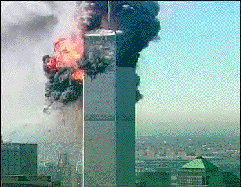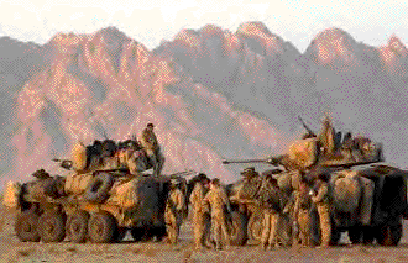Worldwide Terrorism & Crime Against Humanity Index
2002
Why
America
is at War...
|
 |
World Wide Terrorism
 |
U.S. Marines begin to form up their convoy at a staging area near Kandahar, Afghanistan, as they await orders to begin their trek to Kandahar to take control of the airfield on Thursday, Dec. 13, 2001. (AP Photo/Dave Martin, Pool)
Bush Administration Declares War
on Borderless Terrorist Forces World Wide
Bush declares all-out war on the havens of terrorism
By Toby Harnden in Washington
and Anton La Guardia Diplomatic Editor
(Filed: 14/09/2001)
THE world rallied behind America yesterday as President Bush said it was facing "the first war of the 21st century".
President Bush: "There is a quiet anger in America"
Military strategists on both sides of the Atlantic were drawing up plans for a sustained and multi-faceted campaign to defeat international terrorism.
Senior figures in the Bush administration said the response to Tuesday's horrifying attacks on New York and Washington that killed thousands of people would be sophisticated, bloody and without mercy.
Paul Wolfowitz, the deputy Pentagon chief, spoke of a "broad and sustained campaign" of retaliation. He said: "It is not just a matter of capturing people and holding them accountable, but removing the sanctuaries, removing the support systems, ending states which sponsor terrorism."
Gen Colin Powell, the Secretary of State and head of American forces during the Gulf war, confirmed that Osama bin Laden, the Saudi whose terrorist network is based in Afghanistan, was thought to be behind the attacks. But the response would not be limited to one person or group.
He said: "In some cases it may be military action. In some it might be economic action, political action, diplomatic action, financial action: all sorts of things can be used to prosecute a war."
Tony Blair sought to prepare the public and Parliament for the possible use of British forces in a military strike against the terrorists.
He briefed an emergency meeting of the Cabinet on the military options following the world's worst terrorist outrage, in which up to 500 Britons were feared dead.
Arab militants began evacuating Kabul, joining an exodus of foreign aid workers and United Nations staff. Residents began digging trenches as rumours spread of an imminent American attack.
With television banned, Afghans pressed their ears to small transistor radios to hear the latest news of possible retaliation. The Taliban regime was deploying heavy artillery and tanks outside its bases.
Mr Bush was believed to be considering more than unmanned cruise missile strikes which have been used in past anti-terrorist operations. Manned bombing raids and the use of special forces were other possibilities.
The President, who will today visit the scene of devastation around New York's World Trade Centre, said there was "a quiet anger in America" as well as deep sorrow. "I am confident there will be universal approval of the actions this government takes."
He was on the verge of tears as he added: "My resolve is steady and strong about winning this war that has been declared on America."
The US would "lead the world to victory" over terrorism. Two days after the terrorists struck, officials said they believed that there had been 18 hijackers on four planes. They were pursuing "thousands of leads".
Congress moved to allocate $20 billion in additional spending to help recovery and anti-terrorism efforts. There also was discussion about new laws authorising military action.
In an intensive series of diplomatic moves, Gen Powell led American attempts to build a global coalition reminiscent of the alliance that expelled Iraqi forces from Kuwait in 1991.
The initial response was overwhelming moral support from Nato, Russia and the United Nations.
Russia and Nato issued a joint declaration pledging to intensify co-operation against terrorism. They raised the nightmarish prospect that future terrorism could involve weapons of mass destruction.
Lord Robertson, the Nato secretary general, said: "There is the credible possibility that terrorists or rogue states would use ballistic missile technology to take weapons of mass destruction - chemical and biological weapons - into the hearts of cities.
"Science fiction came true this week. It is the responsibility of world leaders to make sure that these other threats are contained and dealt with.
"If they get away with it in New York and Washington, you can be pretty certain they will go for another city next time and Moscow may well be second on the list."
He was speaking after Nato countries said they were ready to invoke article five of the alliance charter, which declares that an attack on one member is an attack on all. Activating the clause would commit Nato members to "assist" America in responding to the attacks.
The UN Security Council approved a unanimous resolution that recognised terrorism as a "threat to international peace and security".
Washington said it was ready to act alone if the words of support around the world were not translated into concrete support. "If the United States acts by itself, we will not be constrained by the fact that we are not working with others," Gen Powell said.
Washington was exerting strong pressure on Pakistan, the main backer of the Taliban, which is sheltering bin Laden. Pakistan's military ruler, President Pervaiz Musharraf, pledged full co-operation with America. But he will have to give up support for the Taliban if he wants to regain the West's confidence.
In Tajikistan, senior officials from countries hostile to the Taliban, including Russia, India and Iran, met to discuss means of helping the anti-Taliban forces in Afghanistan.
The Taliban closed ranks behind bin Laden, making it clear that it had no intention of handing him over to the West.
Source: http://archive.news-telegraph.co.uk/